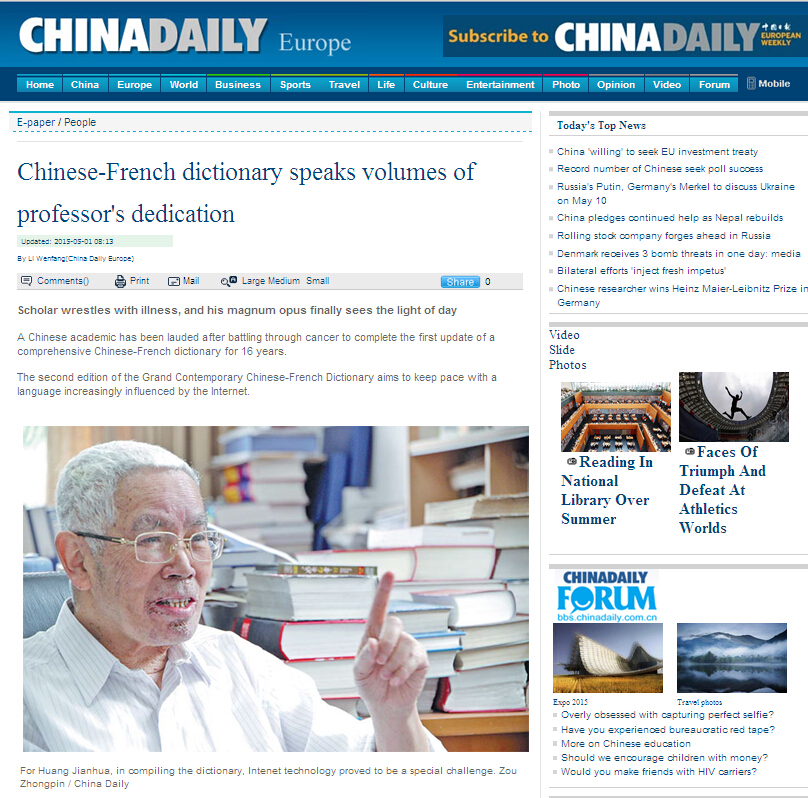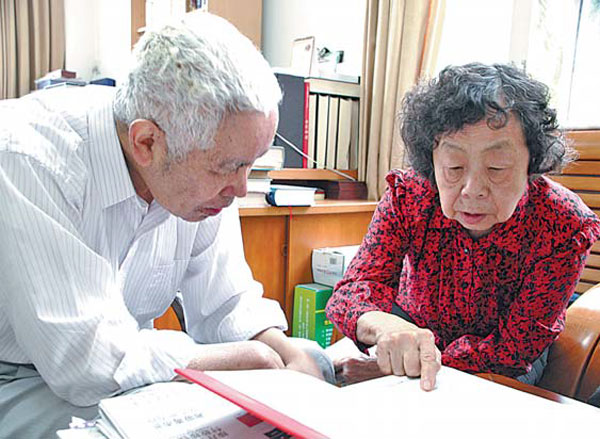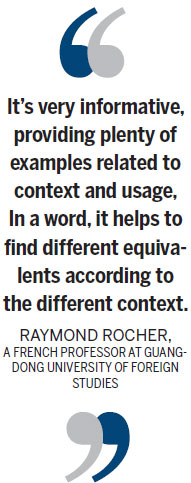编者按 黄建华是我校首任校长、教授、博士生导师。16年来,他矢志不渝、执着奉献,罹癌坚持编纂完成了720万字之巨的国内最大规模《汉法大词典》,为中法文化交流架起了一座彩虹之桥。他以顽强的意志和开拓创新精神赢得了人们的赞誉,成为学术领域和广大师生敬重的典范,今年3月31日,黄建华教授获广东省委宣传部颁授“南粤楷模”荣誉称号。
近日,《中国日报》广东记者站副站长李文芳专门来校采访黄建华教授,深度报道了《汉法大词典》的艰辛编纂过程及其背后的感人故事。5月1日,《中国日报》欧洲版刊发题为《Chinese-French dictionary speaks volumes of professor's dedication》的英文报道,黄建华教授罹病编书的感人事迹在国际上形成了广泛影响。现将报道全文转载如下:

Chinese-French dictionary speaks volumes of professor's dedication
A Chinese academic has been lauded after battling through cancer to complete the first update of a comprehensive Chinese-French dictionary for 16 years.
The second edition of the Grand Contemporary Chinese-French Dictionary aims to keep pace with a language increasingly influenced by the Internet.

For Huang Jianhua, in compiling the dictionary, Intenet technology proved to
be a special challenge. Zou Zhongpin / China Daily

Huang Jianhua and his wife worked on the dictionary.
It includes translations of popular Web words, such as weibo (micro blog), and new phrases, including ditanjingji (low-carbon economy), fangnu (house slave) and tuangou (group buying).
Published by Foreign Language Teaching and Research Press, the book contains more than seven million French words and Chinese characters, almost twice the size of the first edition.
Chief compiler Huang Jianhua, a former president of Guangdong University of Foreign Studies, says the dictionary better caters to both Chinese and French readers, as it labels distinctive Chinese words that often confuse foreigners.
Unlike Chinese-English dictionaries, which are numerous and cover multiple sectors, he says it is harder to compile a Chinese-French dictionary.
"That is why we have included as much information as possible in a single dictionary, to serve the reader," says Huang, who was a student of Liang Zongdai, a renowned poet and translator, at Sun Yat-sen University and Guangdong University of Foreign Studies. "In some cases, we provide a few translations for one word for readers to contemplate."
The book also includes words and phrases widely used in Taiwan, Hong Kong and Macao, as well as some from local dialects.
"It's very informative, providing plenty of examples related to context and usage," says Raymond Rocher, a French professor at Guangdong University of Foreign Studies. "In a word, it helps to find different equivalents according to the different context.
"Huang's bilingual dictionary is definitely a valuable aid to language students and a working tool to professional translators. Moreover, it is easy to use for Chinese or French speakers aiming for efficiency in translation."
Rocher says that one of the main challenges of the project was to find not only an equivalent word but also collocations and phrases to be translated into French.

Liu Qing, vice-president of the Lexicographical Society of China, described the book as a scientific and authoritative work covering a wide range of academic fields, from humanity to natural sciences.
Huang was in his 60s when the publishers commissioned his university in 1998 to produce the dictionary's second edition, which the Ministry of Education later listed as a special project in social sciences.
He and his wife, Yu Xiumei, who also taught French at the university, were the only compilers who worked on the dictionary from beginning to end.
"Before he became ill, my husband often worked in his office until 11:45 at night, while I did my work on the dictionary and house chores at home," Yu says. "He would come back late and say 'Let's call it day' and we would stop for the day."
In 2008, with 20 percent of the dictionary still to finish, Huang was diagnosed with lung cancer and had to undergo surgery. Finding it hard to breath after his operation, he spent time in rehabilitation before resuming his work.
The cancer came back and spread to his bones in 2012, and the side effects from his treatment again hampered progress on the dictionary.
Some people offered to help, including Huang's daughter, who proposed paying native speakers in France to review unfinished sections.
"It was a hard choice," Yu says. "We wanted to remove this burden of work quickly. But my husband's health would not allow it."
A doctorial degree candidate and a young teacher later volunteered their time free of charge.
"I've known professor Huang since my days as cultural attache responsible for linguistic and educational cooperation in South China," Rocher says. "As a great scholar in the long Chinese tradition, humble and sincere, full of humanity, he compiled his dictionary with a strong determination and a hardworking attitude."
When the work was published in December, alumni of the university living overseas told Huang that the dictionary could be used to help foreigners learn Chinese, including those at Confucius Institutes.
Cao Deming, president of Shanghai International Studies University, says the dictionary will not only help train French translators to satisfy the needs in Sino-French economic and cultural exchanges, but also facilitate the spread of Chinese culture.
"French and Chinese languages are quite different in their cultural expressions," Rocher says. "Professor Huang's dictionary is a cultural bridge for a better understanding between China and French-speaking countries.
"Knowing that China is going global in Europe and Africa, I have no doubt the Chinese-French dictionary will be a precious tool for better cooperation."
As some people prefer an Internet search to opening a bulky book, the publisher has announced plans to publish a digital version in the near future.
liwenfang@chinadaily.com.cn
(China Daily European Weekly 05/01/2015 page30)